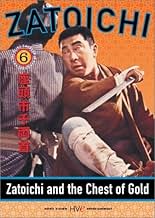IMDb RATING
7.3/10
1.9K
YOUR RATING
Zatoichi is mistaken for a thief. To clear his name he must find and defeat the real villain.Zatoichi is mistaken for a thief. To clear his name he must find and defeat the real villain.Zatoichi is mistaken for a thief. To clear his name he must find and defeat the real villain.
- Director
- Writers
- Stars
Tomisaburô Wakayama
- Jûshirô
- (as Jo Kenzaburo)
Kenjirô Uemura
- Gundayu Matsui
- (uncredited)
- Director
- Writers
- All cast & crew
- Production, box office & more at IMDbPro
Featured reviews
In this classic samurai tale, we follow the deadly trail of Zatoichi-a blind swordsman who has sworn to prove his innocence with regards to his unknowing involvement with the robbery of a chest of gold containing the local farmers tax payment while bringing the real culprits to justice. Here we have the classic hero, the defender and champion of the poor albeit here a most unlikely since the farm villagers think he was responsible for the robbery and he is as he might say "a simple blind man". A bit of suspension of disbelief is required but boy is this ever great stuff! Any fan of sword-fighting films should find much to enjoy here.
This film sure started off well. Instead of the usual credits, these were the coolest ones yet. Against a black background, Zatôichi smokes a cigarette as periodically evil men attack him and he dispatches them like flies--and continues smoking like he's the toughest guy in town!
When the film itself begins, Zatôichi comes upon a humble village where they are having a celebration. It seems that after three years of drought, the villagers had a good harvest and can finally pay off the tax bill. However, when the money is stolen, the villagers stupidly believe the stranger in town (Zatôichi) did it. Considering that he's blind and doesn't leave after the theft, it sure seems ridiculous to blame him. Further, after the townsfolk beat him up, it's also very surprising that our hero would agree to help them find their stolen funds.
Zatôichi assumes boss Chuji is behind the theft and makes his way towards his village. On the way, he meets a beautiful but mysterious lady. He doesn't seem to think much of this meeting, but oddly you later see this lady begging the local bosses to have Zatôichi killed. But why?!
When Zatôichi finally meets up with Chuji, his assumption is proved wrong, though it IS true that some of his men were involved in the theft. Zatôichi swears to continue following the trail to the money AND also now agrees to transport a little boy for Chuji to another town. Oh, that Ichi--always helping others and not thinking one bit about himself!
A bit later, most of Chuji's men are killed and he barely escapes. It seems that Monji (another boss) is NOT Chuji's friend after all and he's in league with Jushiro. At this point, if you are feeling a bit confused, don't worry. Though you may not be able to determine who exactly is who, just rest assured that Zatôichi will be administering a well-earned butt kicking!!
Overall, this is a very good addition to the series. While it lacks some of the heart and back story of the best films in the series, the plot was engaging and different. Well worth seeing.
When the film itself begins, Zatôichi comes upon a humble village where they are having a celebration. It seems that after three years of drought, the villagers had a good harvest and can finally pay off the tax bill. However, when the money is stolen, the villagers stupidly believe the stranger in town (Zatôichi) did it. Considering that he's blind and doesn't leave after the theft, it sure seems ridiculous to blame him. Further, after the townsfolk beat him up, it's also very surprising that our hero would agree to help them find their stolen funds.
Zatôichi assumes boss Chuji is behind the theft and makes his way towards his village. On the way, he meets a beautiful but mysterious lady. He doesn't seem to think much of this meeting, but oddly you later see this lady begging the local bosses to have Zatôichi killed. But why?!
When Zatôichi finally meets up with Chuji, his assumption is proved wrong, though it IS true that some of his men were involved in the theft. Zatôichi swears to continue following the trail to the money AND also now agrees to transport a little boy for Chuji to another town. Oh, that Ichi--always helping others and not thinking one bit about himself!
A bit later, most of Chuji's men are killed and he barely escapes. It seems that Monji (another boss) is NOT Chuji's friend after all and he's in league with Jushiro. At this point, if you are feeling a bit confused, don't worry. Though you may not be able to determine who exactly is who, just rest assured that Zatôichi will be administering a well-earned butt kicking!!
Overall, this is a very good addition to the series. While it lacks some of the heart and back story of the best films in the series, the plot was engaging and different. Well worth seeing.
This one has my favourite intro of the Zatoichi series. It's incredibly stylish with Ichi slaying numerous groups of hostile samurai in the darkness. The way this chapter of Ichi's saga is told was indeed a welcome change to the visuals and storyboarding, which I felt had stagnated in the previous two films. The plot resonates deeply too. Corruption is the theme of this tale, and of course our hero has to sort this mess out by unleashing some calculated chaos upon the twisted fiends in authority. It would be great if things worked like that in the real world. Maybe if each of us were a little more like Ichi, then one day... who knows.
10inframan
I think this stunning film ranks among the great action films of all time but could be hung as stills in any art museum. Hokusai & Hiroshige influences abound.
Yet best of all is the unforgettable character Zatoichi himself. Shintaro Katsu created an everyman/superhero who had no equal, at least in western culture. A squat, homely, bandy-legged self-deprecating blind man full of humor & humility & an abundance of spirituality. And could he make that sword dance.
These movies have no equal. Each one is as perfectly made as any movie can be. I used to go see them when they first appeared in the theaters of San Francisco & Los Angeles Japanese neighborhoods. I still love them every bit as much now.
Yet best of all is the unforgettable character Zatoichi himself. Shintaro Katsu created an everyman/superhero who had no equal, at least in western culture. A squat, homely, bandy-legged self-deprecating blind man full of humor & humility & an abundance of spirituality. And could he make that sword dance.
These movies have no equal. Each one is as perfectly made as any movie can be. I used to go see them when they first appeared in the theaters of San Francisco & Los Angeles Japanese neighborhoods. I still love them every bit as much now.
Zatoichi and the Chest of Gold is one of the most entertaining entries in the franchise and on the same level as the strong predecessor Zatoichi on the Road. The movie starts with Zatoichi paying respects at the grave of a man he wrongfully killed two years ago. He meets some local villagers who are celebrating the fact that they are finally able to pay their tax debts to the local intendant. However, the chest with the money from eighteen different villagers gets stolen by some ruthless ronin. Since Zatoichi was seen near the scene of the crime, he gets accused of a crime he didn't commit and swears to find the real culprit in order to clear his name. Zatoichi starts his investigation by meeting a bandit who has found refuge on a mountain after he was chased away by political opponents. Zatoichi finds out that some of the bandit's men went rogue but realizes the bandit himself is innocent. They team up in order to clear their names, fight the local intendant and his associates who are behind the theft and conspiracy and help the upset villagers.
There are several reasons why this film stands out. First of all, it has a quite fast pace and doesn't waste any time with a lengthy introduction or an overlong conclusion. No scene is unnecessary and no minute is wasted in this dynamic film. Secondly, the movie has a sociocritical component as it portrays how abusive politicians are only interested in their own objectives while poor villagers are constantly tricked and tortured. Thirdly, the movie includes some straightforward humor for the first time in the franchise. In one scene, Zatoichi surprises a beautiful woman in a hot spring and then coincidentally discovers two young perverted men who were peeping through a window in the roof. In another scene, an ugly prostitute offers her services to Zatoichi who remains polite aside of commenting that the woman smells like a field of pumpkin flowers until he realizes that the prostitute demands a hefty sum for a massage which leads him to suggest her she should take a bath from time to time.
In the end, Zatoichi and the Chest of Gold is an entertaining, fast-paced and refreshingly vivid entry in the franchise and you won't see the film's eighty-three astonishing minutes pass. Aside of the refreshing new elements, the fight sequences are great to watch as usual and especially the final duel between the blind masseur and a man on horseback using a whip is quite memorable. Fans of martial arts films can't get around this energetic film that has aged rather well without losing its connection to rural Japan in the mid-nineteenth century.
There are several reasons why this film stands out. First of all, it has a quite fast pace and doesn't waste any time with a lengthy introduction or an overlong conclusion. No scene is unnecessary and no minute is wasted in this dynamic film. Secondly, the movie has a sociocritical component as it portrays how abusive politicians are only interested in their own objectives while poor villagers are constantly tricked and tortured. Thirdly, the movie includes some straightforward humor for the first time in the franchise. In one scene, Zatoichi surprises a beautiful woman in a hot spring and then coincidentally discovers two young perverted men who were peeping through a window in the roof. In another scene, an ugly prostitute offers her services to Zatoichi who remains polite aside of commenting that the woman smells like a field of pumpkin flowers until he realizes that the prostitute demands a hefty sum for a massage which leads him to suggest her she should take a bath from time to time.
In the end, Zatoichi and the Chest of Gold is an entertaining, fast-paced and refreshingly vivid entry in the franchise and you won't see the film's eighty-three astonishing minutes pass. Aside of the refreshing new elements, the fight sequences are great to watch as usual and especially the final duel between the blind masseur and a man on horseback using a whip is quite memorable. Fans of martial arts films can't get around this energetic film that has aged rather well without losing its connection to rural Japan in the mid-nineteenth century.
Did you know
- TriviaJushiro is played by Shintarô Katsu's real-life brother, Tomisaburô Wakayama, who would later star in the Lone Wolf and Cub series of films (produced by Katsu).
- ConnectionsFeatured in Best in Action: 1964 (2020)
- How long is Zatoichi and the Chest of Gold?Powered by Alexa
Details
- Release date
- Country of origin
- Language
- Also known as
- La légende de Zato Ichi
- Production company
- See more company credits at IMDbPro
- Runtime
- 1h 23m(83 min)
- Aspect ratio
- 2.35 : 1
Contribute to this page
Suggest an edit or add missing content

















